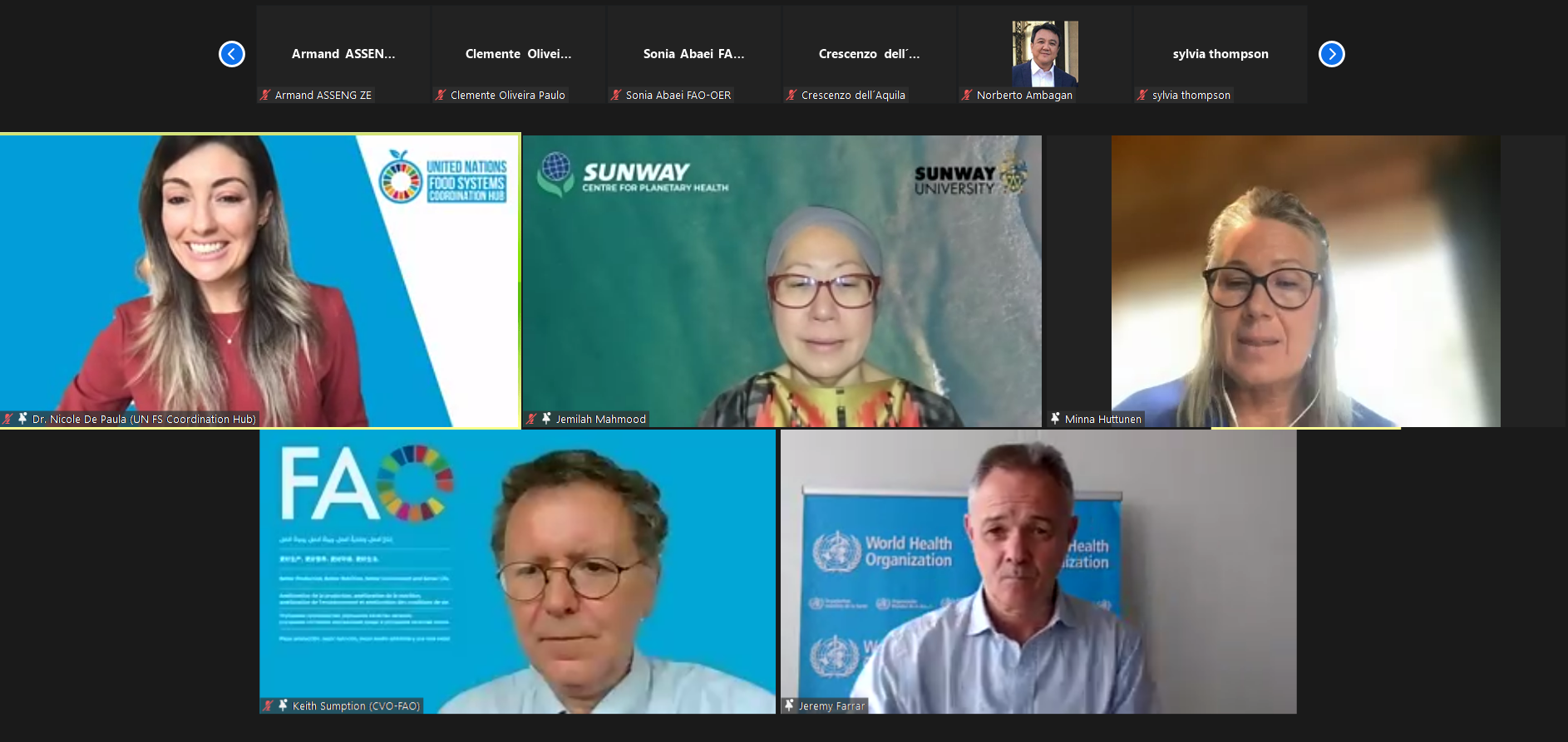Seeding the Future for Planetary Health
A high-level panel of health experts explores the opportunity of food systems transformation for the health of people and the planet during the UN Food Systems Coordination Hub's Webinar Series.

From left to right: Dr. Nicole De Paula, UN Food Systems Coordination Hub; Dr Jemilah Mahmood, Professor and Director at Sunway Centre for Planetary Health; Dr. Minna Huttunen, Ministerial Adviser, Ministry of Agriculture and Forestry, Finland; Dr. Keith Sumption, Chief Veterinary Officer, FAO; Dr. Jeremy Farrar, Chief Scientist, WHO
On 15 June, the UN Food Systems Hub (the Hub) held a webinar on Transforming Food Systems for Planetary Health. Opening the event, Dr. Stefanos Fotiou, Director of the Hub, highlighted the interplay between a thriving environment, nutritious food, and partnerships for human health. The facilitator, Dr. Nicole De Paula, Senior SDGs Expert at the Hub, welcomed all participants, recalling that 3.1 billion people globally still cannot afford a healthy diet, “this reality contributes to a growing burden of premature diseases worldwide.”
Throughout the conversation, many speakers called for a revolutionary shift in our future perspective on food systems. This is because of the vital interplay between the health of animals, people, and the planet, with many observing that the main challenge remains connected to the complexity of managing these relations. “With joint forces...we can advance faster,” stated Dr. Jeremy Farrar, the Chief Scientist for the World Health Organization (WHO). Introducing the opportunities for linking public health and environmental determinants of health, he flagged the importance of combatting inequalities in all our societies and called for enhanced collaboration among relevant UN agencies and stakeholders. In response to a question on policy communication, Farrar stated it is important to celebrate successes as communities, celebrate scientists that go into policymaking, and, finally, make sure that our education system addresses the importance of systems thinking.
Dr. Keith Sumption, Leader of the Priority Program of One Health, Chief Veterinary Officer of the Centre for Zoonoses and Antimicrobial Resistance of the Food and Agricultural Organization (FAO), presented the key achievements of the Quadripartite call to action for One Health for a safer World. He highlighted progress on the policy level at the national level since 67% of the proposals submitted to the World Bank indicated a need to have the One Health approach as part of their development strategies. He reminded all guests of the evolving definition of One Health, which brings more equity across sectors, “Food systems transformation cannot occur without addressing the health of ecosystems, animals, and plants. Everything is connected.”
The second segment of the conversation focused on country experiences with Dr. Minna Huttunen, a Ministerial Adviser at the food safety unit of the Ministry of Agriculture and Forestry in Finland. Huttunen shared the growing interest in the planetary health approach within her government and several positive examples from her national experience, highlighting that Finland is ranked number one in the Global Food Security Index last year. She stressed, “that food safety has guided food policy but now policy must evolve to more sustainable food systems.” She argued the planetary health approach allows a broader perspective as it considers the health of humans intrinsically connected to the health of our ecosystems. Such a holistic perspective is crucial for acknowledging the inherent interdependencies of human well-being with a thriving nature. In closing, the Finish government representative stressed the importance of integrating social sciences to promote innovative solutions in planetary health.
“From evidence to action and from academia to public communication,” was the motto guiding the presentation by Dr. Jemilah Mahmood, a Professor and Director at Sunway Centre for Planetary Health and former Special Advisor to the Prime Minister of Malaysia on Public Health. Pointing out that addressing the complexities of food systems is at the top of the Malaysian development agenda, she described how the government is originally developing a national planetary health action plan, “the first in Asia.” She also focused on the high importance of research and evidence-based decision-making to advance the uptake of the planetary health approach at the policy level. In addition, she noted the necessity of bringing the private sector on board as it drives the economy in many parts of the Global South. She stated, “If you want to move the agenda on planetary health on a multi-systems approach, you must invest in good governance and an education revolution.”
The event was organized to contribute to the upcoming Food Systems Summit +2 Stocktaking Moment (UNFSS+2), which will take place on 24-26 July 2023 in Rome, Italy. Convened by the UN Secretary-General António Guterres and hosted by the government of Italy, the Summit will be a milestone moment for countries to showcase how food systems transformations can support the implementation of the Sustainable Development Goals.
This webinar is part of a series led by the UN Food Systems Coordination Hub. The next one will be on Applying Systems Thinking for Food Systems Transformation, which will take place on 5 October 2023.
